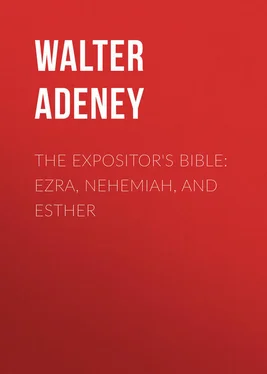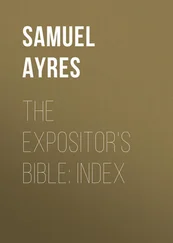Walter Adeney - The Expositor's Bible - Ezra, Nehemiah, and Esther
Здесь есть возможность читать онлайн «Walter Adeney - The Expositor's Bible - Ezra, Nehemiah, and Esther» — ознакомительный отрывок электронной книги совершенно бесплатно, а после прочтения отрывка купить полную версию. В некоторых случаях можно слушать аудио, скачать через торрент в формате fb2 и присутствует краткое содержание. Издательство: Иностранный паблик, Жанр: foreign_religion, foreign_antique, foreign_prose, на английском языке. Описание произведения, (предисловие) а так же отзывы посетителей доступны на портале библиотеки ЛибКат.
- Название:The Expositor's Bible: Ezra, Nehemiah, and Esther
- Автор:
- Издательство:Иностранный паблик
- Жанр:
- Год:неизвестен
- ISBN:нет данных
- Рейтинг книги:3 / 5. Голосов: 1
-
Избранное:Добавить в избранное
- Отзывы:
-
Ваша оценка:
- 60
- 1
- 2
- 3
- 4
- 5
The Expositor's Bible: Ezra, Nehemiah, and Esther: краткое содержание, описание и аннотация
Предлагаем к чтению аннотацию, описание, краткое содержание или предисловие (зависит от того, что написал сам автор книги «The Expositor's Bible: Ezra, Nehemiah, and Esther»). Если вы не нашли необходимую информацию о книге — напишите в комментариях, мы постараемся отыскать её.
The Expositor's Bible: Ezra, Nehemiah, and Esther — читать онлайн ознакомительный отрывок
Ниже представлен текст книги, разбитый по страницам. Система сохранения места последней прочитанной страницы, позволяет с удобством читать онлайн бесплатно книгу «The Expositor's Bible: Ezra, Nehemiah, and Esther», без необходимости каждый раз заново искать на чём Вы остановились. Поставьте закладку, и сможете в любой момент перейти на страницу, на которой закончили чтение.
Интервал:
Закладка:
It is a historical fact that Cyrus did help to build the temple; he supplied funds from the public treasury for that object. We can understand his motives for doing so. If he desired the favour of the God of the Jews, he would naturally aid in restoring His shrine. Nabonidas had fallen, it was thought, through neglecting the worship of the gods. Cyrus seems to have been anxious to avoid this mistake, and to have given attention to the cultivation of their favour. If, as seems likely, some of the Jews had impressed his mind with the greatness of Jehovah, he might have desired to promote the building of the temple at Jerusalem with exceptional assiduity.
In the next place, Cyrus gives the captive Jews leave to go up to Jerusalem. The edict is purely permissive. There is to be no expulsion of Jews from Babylon. Those exiles who did not choose to avail themselves of the boon so eagerly coveted by the patriotic few were allowed to remain unmolested in peace and prosperity. The restoration was voluntary. This free character of the movement would give it a vigour quite out of proportion to the numbers of those who took part in it, and would, at the same time, ensure a certain elevation of tone and spirit. It is an image of the Divine restoration of souls, which is confined to those who accept it of their own free will.
Further, the object of the return, as it is distinctly specified, is simply to rebuild the temple, not – at all events in the first instance – to build up and fortify a city on the ruins of Jerusalem; much less does it imply a complete restoration of Palestine to the Jews, with a wholesale expulsion of its present inhabitants from their farms and vineyards. Cyrus does not seem to have contemplated any such revolution. The end in view was neither social nor political, but purely religious. That more would come out of it, that the returning exiles must have houses to live in and must protect those houses from the brigandage of the Bedouin, and that they must have fields producing food to support them and their families, are inevitable consequences. Here is the germ and nucleus of a national restoration. Still it remains true that the immediate object – the only object named in the decree – is the rebuilding of the temple. Thus we see from the first that the idea which characterises the restoration is religious. The exiles return as a Church. The goal of their pilgrimage is a holy site. The one work they are to aim at achieving is to further the worship of their God.
Lastly, the inhabitants of the towns in which the Jews have been settled are directed to make contributions towards the work. It is not quite clear whether these "Benevolences" are to be entirely voluntary. A royal exhortation generally assumes something of the character of a command. Probably rich men were requisitioned to assist in providing the gold and silver and other stores, together with the beasts of burden which would be needed for the great expedition. This was to supplement what Cyrus calls "the free-will offering for the house of God that is in Jerusalem" — i. e. , either the gifts of the Jews who remained in Babylon, or possibly his own contribution from the funds of the state. We are reminded of the Hebrews spoiling the Egyptians at the Exodus. The prophet Haggai saw in this a promise of further supplies, when the wealth of foreign nations would be poured into the temple treasury in donations of larger dimensions from the heathen. "For thus saith the Lord of hosts," he writes, "Yet once, it is a little while, and I will shake the heavens, and the earth, and the sea, and the dry land; … and the desirable things of all nations shall come, and I will fill this house with glory, saith the Lord of hosts. The silver is mine, and the gold is mine, saith the Lord of hosts." 11 11 Hag. ii. 6-8.
The assumed willingness of their neighbours to contribute at a hint from the king suggests that the exiles were not altogether unpopular. On the other hand, it is quite possible that, under the oppression of Nabonidas, they had suffered much wrong from these neighbours. A public persecution always entails a large amount of private cruelty, because the victims are not protected by the law from the greed and petty spite of those who are mean enough to take advantage of their helpless condition. Thus it may be that Cyrus was aiming at a just return in his recommendation to his subjects to aid the Jews.
Such was the decree. Now let us look at the execution of it.
In the first place, there was a ready response on the part of some of the Jews, seen especially in the conduct of their leaders, who "rose up," bestirring themselves to prepare for the expedition, like expectant watchers released from their weary waiting and set free for action. The social leaders are mentioned first, which is a clear indication that the theocracy, so characteristic of the coming age, was not yet the recognised order. A little later the clergy will be placed before the laity, but at present the laity are still named before the clergy. The order is domestic. The leaders are the heads of great families – "the chief of the fathers." For such people to be named first is also an indication that the movement did not originate in the humbler classes. Evidently a certain aristocratic spirit permeated it. The wealthy merchants may have been loath to leave their centres of commerce, but the nobility of blood and family were at the head of the crusade. We have not yet reached the age of the democracy. It is clear, further, that there was some organisation among the exiles. They were not a mere crowd of refugees. The leaders were of the tribes of Judah and Benjamin. We shall have to consider the relation of the Ten Tribes to the restoration later on; here it may be enough to observe in passing that representatives of the Southern Kingdom take the lead in a return to Jerusalem, the capital of that kingdom. Next come the ecclesiastical leaders, the priests and Levites. Already we find these two orders named separately – an important fact in relation to the development of Judaism that will meet us again, with some hints here and there to throw light upon the meaning of it.
There is another side to this response. It was by no means the case that the whole of the exiles rose up in answer to the edict of Cyrus; only those leaders and only those people responded "whose spirit God had raised." The privilege was offered to all the Jews, but it was not accepted by all. We cannot but be impressed by the religious faith and the inspired insight of our historian in this matter. He saw that Cyrus issued his edict because the Lord had stirred up his spirit; now he attributes the prompting to make use of the proffered liberty to a similar Divine influence. Thus the return was a movement of heaven-sent impulses throughout. Ezekiel's vision of the dry bones showed the deplorable condition of the Northern Kingdom in his day – stripped bare, shattered to fragments, scattered abroad. The condition of Judah was only second to this ghastly national ruin. But now to Judah there had come the breath of the Divine Spirit which Ezekiel saw promised for Israel, and a living army was rising up in new energy. Here we may discover the deeper, the more vital source of the return. Without this the edict of Cyrus would have perished as a dead letter. Even as it was, only those people who felt the breath of the Divine afflatus rose up for the arduous undertaking. So to-day there is no return to the heavenly Jerusalem and no rebuilding the fallen temple of human nature except in the power of the Spirit of God. Regeneration always goes hand in hand with redemption – the work of the Spirit with the work of the Christ. In the particular case before us, the special effect of the Divine influence is "to raise the spirit" — i. e. , to infuse life, to rouse to activity and hope and high endeavour. A people thus equipped is fit for any expedition of toil or peril. Like Gideon's little, sifted army, the small band of inspired men who rose up to accept the decree of Cyrus carried within their breasts a superhuman power, and therefore a promise of ultimate success. The aim with which they set out confirmed the religious character of the whole enterprise. They accepted the limitations and they gladly adopted the one definite purpose suggested in the edict of Cyrus. They proceeded "to build the house of the Lord which is in Jerusalem." This was their only confessed aim. It would have been impossible for patriots such as these Jews were not to feel some national hopes and dreams stirring within them; still we have no reason to believe that the returning exiles were not loyal to the spirit of the decree of the Great King. The religious aim was the real occasion of the expedition. So much the more need was there to go in the Spirit and strength of God. Only they whose spirit God has raised are fit to build God's temple, because work for God must be done in the Spirit of God.
Читать дальшеИнтервал:
Закладка:
Похожие книги на «The Expositor's Bible: Ezra, Nehemiah, and Esther»
Представляем Вашему вниманию похожие книги на «The Expositor's Bible: Ezra, Nehemiah, and Esther» списком для выбора. Мы отобрали схожую по названию и смыслу литературу в надежде предоставить читателям больше вариантов отыскать новые, интересные, ещё непрочитанные произведения.
Обсуждение, отзывы о книге «The Expositor's Bible: Ezra, Nehemiah, and Esther» и просто собственные мнения читателей. Оставьте ваши комментарии, напишите, что Вы думаете о произведении, его смысле или главных героях. Укажите что конкретно понравилось, а что нет, и почему Вы так считаете.












